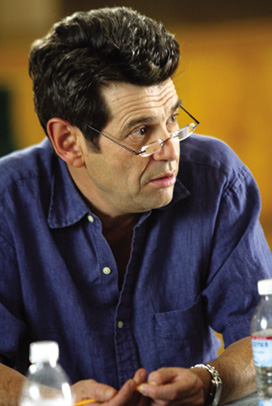|
Reviews of Recent Independent, Foreign, & Documentary Films in Theaters and DVD/Home Video
FRANKIE AND JOHNNY ARE MARRIED
I don't mind going to a friend's house to watch home movies, but I'm less enthused about paying
to see them in a theater. Frankie and Johnny Are Married, which is billed as an
"autobiographical comedy," is basically an elaborate home movie - albeit with some entertaining
moments thanks to one standout performance.
The home in which this movie takes place belongs to Michael Pressman, a successful TV
producer best known for helming the TV series Chicago Hope (he plays himself).
His workaholic schedule has frayed his 10-year marriage to Lisa Chess, an actress whose career
can charitably be described as slender. Seeking to put enthusiasm back into his marriage and help
call attention to his wife's talents, Pressman puts his TV work on hold and decides to finance and
direct Chess in an Equity-waiver stage production of Terrence McNally's Frankie and Johnny
in the Clair De Lune. Almost from the beginning, the project goes haywire. Pressman
underestimates the budget, which balloons to $100,000 of his own funds thanks to an endless
series of delays and difficulties. The producer proves to be incompetent, the set designer abruptly
quits, the production is poorly promoted, and the actor playing Johnny proves to be an obnoxious
creep who cannot remember his lines. Pressman, who has turned down lucrative TV projects to
pursue this modest fiasco, cancels the show after a disastrous preview, but then abruptly
resurrects it by casting himself as Johnny - even though he has not acted in 30 years.
Pressman presents himself as a generous teddy bear trying to mollify everyone with gentle,
fatherly wisdom. Much of this seems a bit false (a scene in which Pressman appeases a seemingly
incoherent Mandy Patinkin on the set of Chicago Hope is especially strained), and
Pressman often doesn't have the backbone to put goof-offs in their place (especially the horrible
leading man who wrecks the preview with a slovenly performance). Yet his on-screen persona is
so cheery and good-natured that it is difficult to find fault with his weaknesses, even when he is
engaged in obviously idiotic pursuits, like sinking another $25,000 into the cash-strapped show.
As his leading lady, Chess is somewhat more prickly. She repeatedly informs him of the folly of
his financing the show and is understandably upset when Pressman fails to aid her when she is
verbally abused by her co-star. Yet the film strikes another false note when Chess insists that
Pressman not go out of his way to shine the spotlight on her. The stage show and this subsequent
film are clearly designed to focus on her, so her repeated insistence on not being the center of his
professional attention rings hollow. Her on-screen romantic chemistry with Pressman is
completely flat, which only confuses matters more.
Some of Pressman's friends and associates, including TV producer David E. Kelley and CBS
network chief Les Moonves, show up in bit parts playing themselves. Their appearances here
only contribute to the home movie aspect of the production. Shot in a mix of digital video and 35mm, Frankie and Johnny Are Married has a
discombobulated visual style. The inability to maintain a coherent look doesn't enhance the film.
But the oxygen here, and the sole reason to see this film, is the extraordinary Alan Rosenberg as
the nightmarish co-star of the production. The role is a heavily fictionalized version of what
occurred in real life, but Rosenberg goes to town as the actor from hell, and he steals the film
with his breathlessly funny performance. Whether engaging in exaggerated breathing exercises or
picking inane fights with everyone around him or casually looking off-stage for reminders of the
lines he never bothered to memorize, Rosenberg is pricelessly funny as the arrogant thespian
whose ego outstrips his talent. When Rosenberg is on-screen, the film soars. Phil Hall
|
